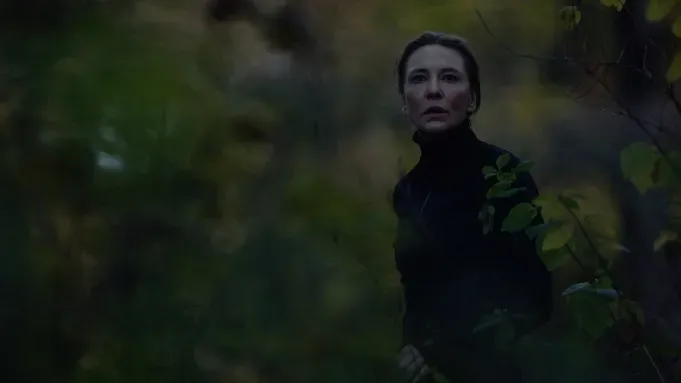Didn't You Feel Triumphant? On Tár and Guilt

For better or worse, this is one of the few post-2010/post-image-hypersaturation films (along with Gone Girl and The Card Counter) to render, in all their prickly and discomforting detail, the conditions of modernity that transform the painful process of creating an identity into a branding exercise- that, for lack of a more elegant way of bridging a connection between, create a person like Lydia Tár.
These conditions manifest in the very textures and echoes of the spaces she occupies- the almost incandescent, blindingly white lighting that casts her as a wax plastique figure, the rhythmic sonic signatures of her increasingly futile attempts to compartmentalise her life, the messages from the dead that persist even when they are deleted. To deliberate upon any of this in terms of morality is to succumb to Field’s tendency for misdirection- not unlike the film where he played the role of an informer of the conspiratorial instead of its machinator, TÁR tantalizes, leaving in its thunderingly loud silences and multitude of empty doorways traces of something to try and rationalise the slow dissolution of aspirations that took decades to actualise. The slow but sure dissonance that begins to echo throughout the spaces (not places) that Lydia occupies is imbued with a heady delirium that is almost impossible to resist being entrapped by, bolstered by the many pauses and stutters that seem to validate the notion that everyone around Lydia is somehow lying to her.
But of course, as with Eyes Wide Shut, once the veil is torn open, there exists nothing but a steep descent into the claws of forces beyond your control, because as much as the film deliberates upon questions of institutional accountability and the proliferation of the image and the machinations of power exerted by artists, it is fundamentally a work haunted in every corner by something with undeniable physical presence. The hauntological, here, is not mere allegory or metaphor-Lydia is not merely “haunted” by the voices of the women she exploited, she is haunted by their very souls, which take the form of the most recent member to join their ranks. Field’s spatialisation of the hauntological leaves little room for any denial of their existence- and why would it? Is it really so difficult to believe that hiding within the edges of mirrors and lurking by your bedside whilst you slumber are spectres, singing softly to you in alleyways and taunting you with facile shrieks in the woods? Is it really so absurd that, within the cracks and crevices of the little contradictions and fabrications and misrepresentations we scatter throughout the sentences we construct, are spectres borne of the tension between the images we project with such vigour and the pathetic, snivelling child that lies behind those images?
Since I saw this last September, I have been kept awake by the screams from The Blair Witch Project that are conjured in TÁR as a mere component of its conspiratorial delirium. It is less the piercing volume of these shrieks and their origin, however, than it is the context within which they are conjured- suggestions of not just the screams let out during the plunge into a river or the slitting of wrists but by the screams yet to come, the screams that are inevitable precisely because no matter the personal humiliation Lydia undergoes, she emerges through the tunnel in much the same position as at the beginning of the film- she still has an audience rendered rapt by her gestures, whilst the ghosts following her are left unheard and unaccounted for, to be construed as mere metaphor or allegory in so much of the writing that has already been published about this film. These screams are what, sparingly but definitely, force Lydia to take a peek at herself in a mirror. As it becomes evident after her meticulous extrication from the streams of capital that protected her, her only real response to this brief insight as to what she has become is to throw up. She tries, and has likely spent decades, trying so hard to become something that was far outside her milieu, and when she has finally occupied that role, she finds that there is simply nowhere else to go but down.
I cannot say my aspirations are dissimilar to those of the Lydia Tár that existed decades ago within the film- to become not a person but a name, with immediate associations of formal mastery and a rarefied artistic output. But what TÁR necessitates that I have avoided for so long is to look honestly, clearly, without the boundaries of classification, as to what I really am, what I am capable of doing and what I am willing to do in order to become that name. What I have realised so acutely by looking at where Lydia Tár finally arrives in the film’s cosmic joke of a final image is that I am, to a great degree, afraid of looking- because if I really do look at what I am, stripped of the flimsy defences of metaphor and allegory, I cannot say I like what I see.
